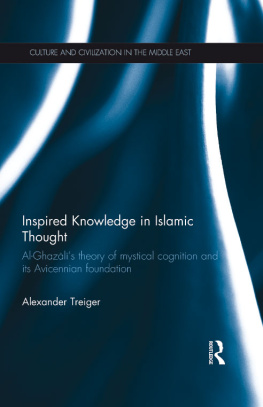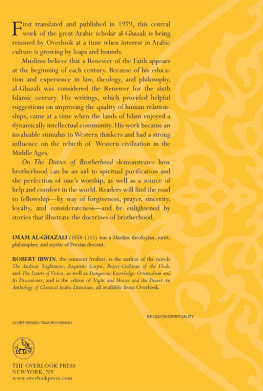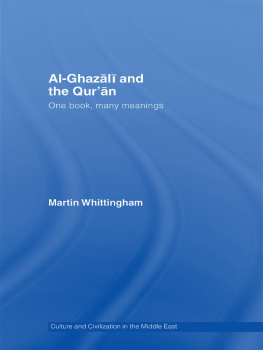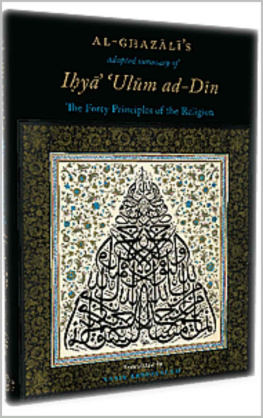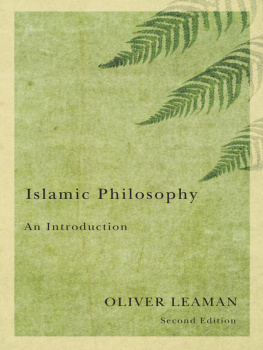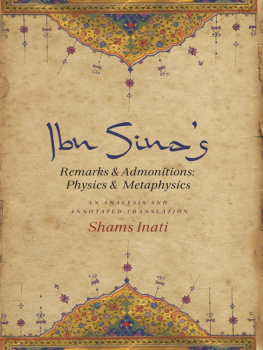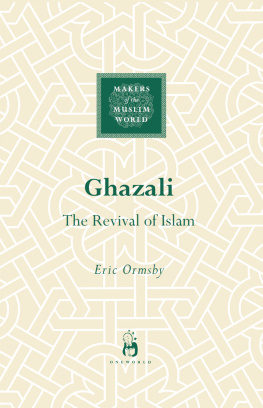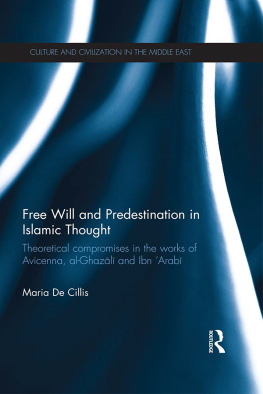Alexander Treiger - Inspired Knowledge in Islamic Thought: Al-Ghazali’s Theory of Mystical Cognition and Its Avicennian Foundation
Here you can read online Alexander Treiger - Inspired Knowledge in Islamic Thought: Al-Ghazali’s Theory of Mystical Cognition and Its Avicennian Foundation full text of the book (entire story) in english for free. Download pdf and epub, get meaning, cover and reviews about this ebook. year: 2011, publisher: Routledge, genre: Religion. Description of the work, (preface) as well as reviews are available. Best literature library LitArk.com created for fans of good reading and offers a wide selection of genres:
Romance novel
Science fiction
Adventure
Detective
Science
History
Home and family
Prose
Art
Politics
Computer
Non-fiction
Religion
Business
Children
Humor
Choose a favorite category and find really read worthwhile books. Enjoy immersion in the world of imagination, feel the emotions of the characters or learn something new for yourself, make an fascinating discovery.
- Book:Inspired Knowledge in Islamic Thought: Al-Ghazali’s Theory of Mystical Cognition and Its Avicennian Foundation
- Author:
- Publisher:Routledge
- Genre:
- Year:2011
- Rating:4 / 5
- Favourites:Add to favourites
- Your mark:
Inspired Knowledge in Islamic Thought: Al-Ghazali’s Theory of Mystical Cognition and Its Avicennian Foundation: summary, description and annotation
We offer to read an annotation, description, summary or preface (depends on what the author of the book "Inspired Knowledge in Islamic Thought: Al-Ghazali’s Theory of Mystical Cognition and Its Avicennian Foundation" wrote himself). If you haven't found the necessary information about the book — write in the comments, we will try to find it.
It has been customary to see the Muslim theologian Abu Hamid al-Ghazali (d. 1111) as a vehement critic of philosophy, who rejected it in favour of Islamic mysticism (Sufism), a view which has come under increased scrutiny in recent years.
This book argues that al-Ghazali was, instead, one of the greatest popularisers of philosophy in medieval Islam. The author supplies new evidence showing that al-Ghazali was indebted to philosophy in his theory of mystical cognition and his eschatology, and that, moreover, in these two areas he accepted even those philosophical teachings which he ostensibly criticized. Through careful translation into English and detailed discussion of more than 80 key passages (with many more surveyed throughout the book), the author shows how al-Ghazalis understanding of mystical cognition is patterned after the philosophyof Avicenna (d. 1037). Arguing that despite overt criticism, al-Ghazali never rejected Avicennian philosophy and that his mysticism itself is grounded in Avicennas teachings, the book offers a clear and systematic presentation of al-Ghazalis philosophical mysticism.
Challenging popular assumptions about one of the greatest Muslim theologians of all time, this is an important reference for scholars and laymen interested in Islamic theology and in the relations between philosophy and mysticism.
Alexander Treiger: author's other books
Who wrote Inspired Knowledge in Islamic Thought: Al-Ghazali’s Theory of Mystical Cognition and Its Avicennian Foundation? Find out the surname, the name of the author of the book and a list of all author's works by series.

